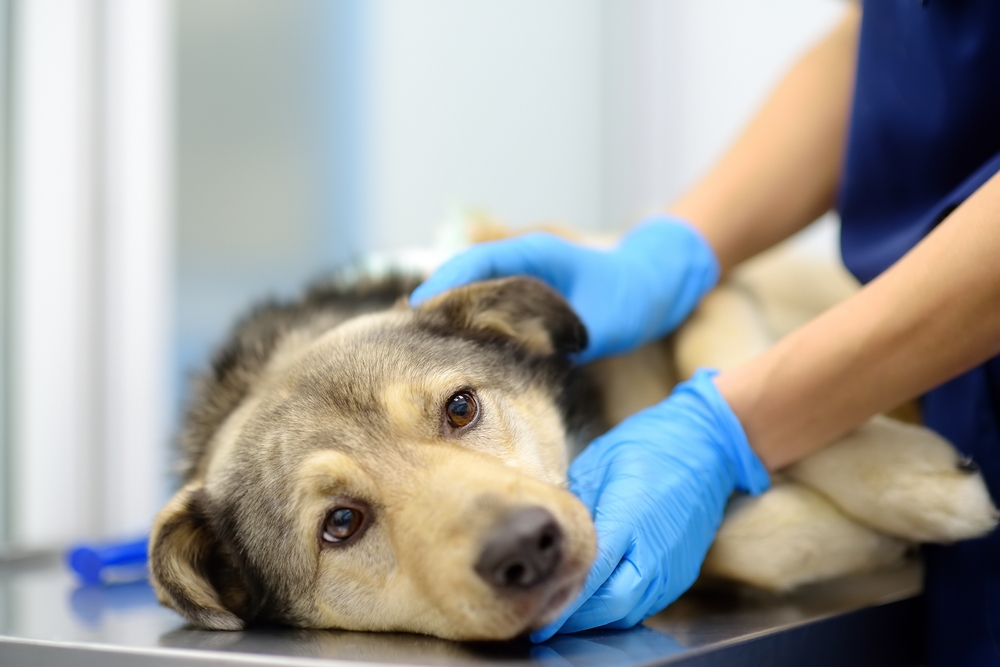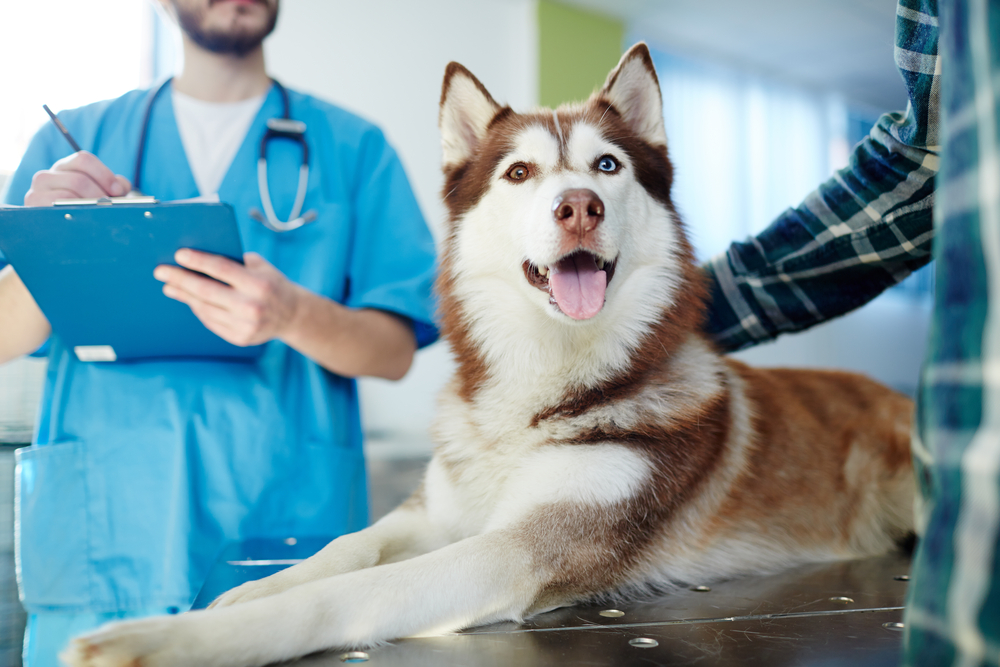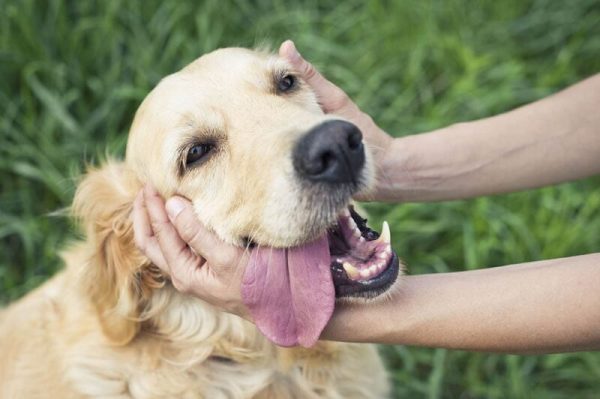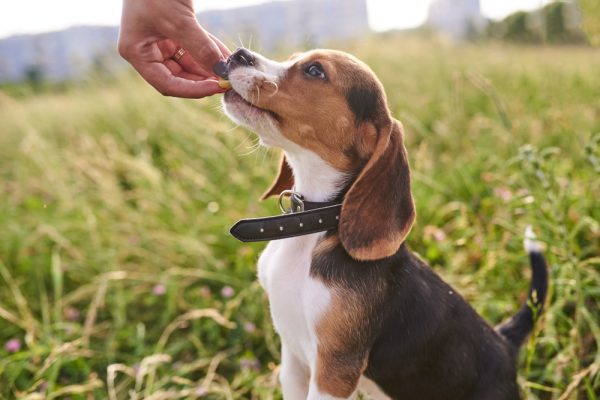In this article
We’re sorry to hear your dog is unwell, so we’ll get right to the point. Dark red or black vomit is usually due to blood in the vomit. Vivid red excretions usually signal fresh blood. As the blood oxidizes over time, it gets darker and turns black. Black or brown blood in the vomit is often described as having a “coffee grounds” appearance as the blood forms clumps when it coagulates.
However, before you panic, it might be a good idea to put on a rubber glove and examine the vomit. Sometimes, when your dog eats something black, brown, or red, for example, plastic, charcoal, crayons, or fertilizer, it can lead to these colors coming up in the vomit. Before rushing off to the vet, look around and see if there’s anything your cheeky little friend might have gotten into. Sometimes, these items are toxic, so a trip to the vet may still be warranted.
If you’re unsure, take a photo (we love photos) or put the vomit in a bag and take it to the vet. You should also make sure your dog is vomiting. While this sounds silly, coughing can look a lot like vomiting, and sometimes people find diarrhea and think that it’s vomit.

What Causes Blood in Vomit?
Blood in the vomit is known as “hematemesis.” It usually signals a problem in the stomach, but there are a few other options to consider. Blood clotting disorders, for example, can lead to bleeding anywhere in the body, including the digestive tract.
Rat bait is a common toxin that prevents dogs from forming normal blood clots 48–72 hours after ingestion. If your dog has been hit by a car or some other trauma, internal bleeding could lead to blood in the vomit.
Gastric ulcers are the most common cause of blood in vomit. The stomach normally has a protective lining to guard from damage by stomach acid. The production of gastric acid and protective mucus occurs in a delicate balance, which can be disrupted, leading to gastric ulcers. Blood flow into the stomach is also an important protective feature that helps clear gastric acid from the cells and supports the turnover of cells at the surface, so any disruption to blood flow from stress, shock, or vigorous exercise can compromise the stomach’s protection.
Once a gastric ulcer forms, a vicious cycle begins because the stomach acid disrupts healing and causes more damage around the ulcer. When an ulcer affects all the layers of the stomach, the full-thickness perforation leads to stomach contents leaking into the abdomen. This is the most severe and life-threatening consequence of an ulcer.

Non-steroidal anti-inflammatories (NSAIDs) are medications that can reduce the stomach’s protective lining as a side effect. Combining NSAIDs or using NSAIDs with corticosteroids increases the risk of stomach ulcers when using these drugs. Liver failure from various causes can cause gastric ulceration.
While the mechanism for this is unknown, it may be secondary to increased gastric acid secretion or reduced blood flow to the stomach. Stomach cancers can bleed, leading to hematemesis, but they can also cause gastric ulcers by producing hormones that trigger gastric acid secretion.
Acute hemorrhagic diarrhea syndrome is a condition that is common in young, small-breed dogs, especially Miniature Schnauzers, Maltese, and Miniature Poodles. It is thought to be a sensitivity to bacterial toxins and can lead to blood in the vomit and stools.
- Addison’s disease
- Intestinal foreign body
- Previous stomach surgery
- Infections, e.g., parasitic, viral, bacterial
- Kidney failure
- Toxins
- Inflammatory bowel disease
- Pancreatitis
Seek veterinary advice if you’re concerned about your pet’s well-being.
If you need to speak with a vet but can't get to one, head over to PangoVet. It's our online service where you can talk to a vet online and get the advice you need for your pet — all at an affordable price!


How Is Blood in Vomit Treated?

If your dog is vomiting blood, they will need urgent veterinary attention. This is not something you want to leave until next week to see it improve since even mild cases can become life-threatening quickly. In addition, if there is a significant amount of blood or your pup shows signs like lethargy, pale gums, black, tarry stools, or fresh blood in diarrhea, you should go to the emergency clinic immediately.
After taking a thorough history and examining your dog, your vet will know the likely differentials for your pet.
- Hematology: This is a complete red and white cell count to rule out anemia and low platelet counts. High white cell counts could also indicate an infection.
- Clotting tests: Activated clotting time (ACT), prothrombin time (PT), and activated partial thromboplastin time (PTT) can ensure your dog can form blood clots.
- Biochemistry: This looks for underlying metabolic disease and tests the organ function.
- Imaging: This includes ultrasounds and X-rays to check for masses, intestinal foreign bodies, perforation, and other issues.
- Gastroduodenoscopy: This involves using a scope to diagnose the cause of bleeding or evaluate surgical options.
- Fecal testing: This identifies infectious agents like parasites, bacteria, and viruses.
Medical treatment will likely commence around the same time as the diagnostic procedures. In mild cases, vets may opt for a treatment trial instead of an extensive work-up, especially if the underlying cause is suspected based on a dog’s history.
- Bland diet
- Gastroprotectant medications to reduce stomach acidity or provide a protective lining to the stomach
- Anti-nausea medication
- Treating the underlying cause, for example, stopping NSAID medication or supplementing vitamin K in cases of rat bait toxicity
- Antibiotics if there is a bacterial infection or risk of secondary bacterial infection
- Intravenous fluid therapy or fluid drip for dehydrated pets
- Blood transfusion for anemic dogs
In some cases, surgery is necessary to remove tumors, correct gastric perforation, or remove ulcers that don’t respond to medical treatment. Some pups may be well enough to go home the same day as their vet visit.
In most cases, hospitalized dogs are discharged within a few days of treatment. However, some severe cases have a poor prognosis and may not recover, but it depends on your dog’s diagnosis. This is something you should discuss with your veterinarian.


Final Thoughts
If your dog’s vomit is dark red or black, and nothing obvious that they have eaten that would lend this color, it’s likely from blood in the digestive tract. Don’t let the condition worsen before seeking veterinary help for your dog. If you’re unsure about the contents, bring a sample or some photos to help your vet get a good picture of what is happening.
Featured Image Credit: felixmontana88, Shutterstock






















